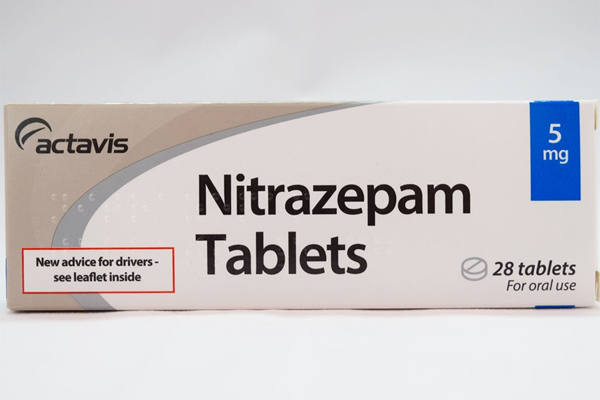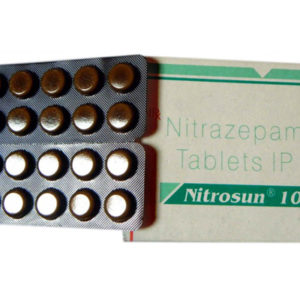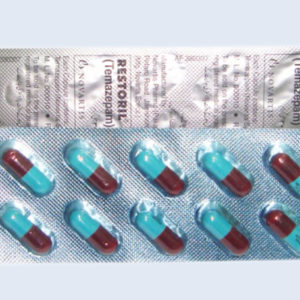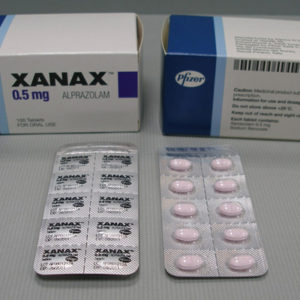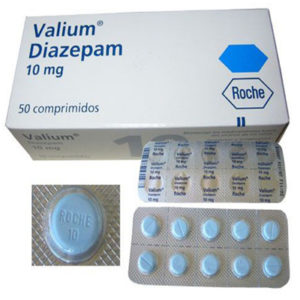Description
HOW DOES THIS MEDICATION WORK? WHAT WILL IT DO FOR ME?
Nitrazepam 5mg belongs to the class of medications called benzodiazepines. It is used for short-term treatment of sleeping problems (insomnia), such as difficulty falling asleep, frequent awakenings during the night, and early-morning awakening. It is also used to manage myoclonic seizures.It works by slowing down the nerves in the brain (the central nervous system).
This medication may be available under multiple brand names and/or in several different forms. Any specific brand name of Mogadon may not be available in all of the forms or approved for all of the conditions discussed here. As well, some forms of Mogadon may not be used for all of the conditions discussed here.
Your doctor may have suggested Mogadon for conditions other than those listed in these drug information articles. If you have not discussed this with your doctor or are not sure why you are taking Mogadon, speak to your doctor. Do not stop taking this medication without consulting your doctor.
Do not give Mogadon to anyone else, even if they have the same symptoms as you do. It can be harmful for people to take Mogadon if their doctor has not prescribed it.
WHAT FORM(S) DOES NITRAZEPAM 5MG COME IN?
5 mg
Each white, round, flat-faced, bevelled-edged tablet, scored on one side and embossed “RHO 5” on the other side, contains nitrazepam 5 mg. Nonmedicinal ingredients: lactose, magnesium stearate, microcrystalline cellulose, and sodium croscarmellose.
10 mg
Each white round, flat-faced, bevelled-edged tablet, scored on one side and embossed “RHO 10” on the other side, contains nitrazepam BP 10 mg. Nonmedicinal ingredients: lactose, magnesium stearate, microcrystalline cellulose, and sodium croscarmellose.
HOW SHOULD I USE THIS MEDICATION?
The recommended adult dose of nitrazepam 5mg when taken for insomnia is 5 mg to 10 mg taken at bedtime.
Seniors may be more likely to experience unwanted effects of Mogadon and should start with 2.5 mg taken at bedtime.
The lowest effective dose should be used. It is important that the dose be individualized to your specific needs to avoid excessive drowsiness during the day time or motor impairment.
This medication is normally used for a short period of time or as an “as required” medication. As it may be habit-forming, the treatment period should be as short as possible and not usually longer than 7 to 10 consecutive days. If you need this medication for more than 2 to 3 weeks, consult your doctor for a re-evaluation of this medication.
When taken for treatment of myoclonic seizures, the dose is based primarily on body weight. The dose for children (up to 30 kg of body weight) ranges from 0.3 mg per kilogram of body weight to 1 mg per kilogram of body weight daily in 3 divided doses. Your doctor will calculate an appropriate dose.
Many things can affect the dose of medication that a person needs, such as body weight, other medical conditions, and other medications. If your doctor has recommended a dose different from the ones listed here,do not change the way that you are taking Mogadon without consulting your doctor.
nitrazepam 5mg may be habit-forming when taken for long periods of time. It may not be appropriate for people who have a history of alcohol or substance abuse.
If you have been taking Mogadon regularly for a long period of time (more than one month), do not stop taking the medication without speaking with your doctor. A gradual reduction in dose is recommended when stopping this medication to avoid withdrawal effects.
It is important to take this medication exactly as prescribed by your doctor. Do not take this medication in a larger amount or for a longer period of time than prescribed by your doctor. If you miss a scheduled dose, take it as soon as possible and continue with your regular schedule. If you are taking nitrazepam 5mg for sleeping, do not take it if you will not be able to get a full night’s sleep (approximately 8 hours or more). This medication tends to make people disoriented, uncoordinated and unable to concentrate clearly until it has worn off. If you remember the missed dose during the daytime, skip the missed dose and continue with your regular dosing schedule. Do not take a double dose to make up for a missed one. If you are not sure what to do after missing a dose, contact your doctor or pharmacist for advice.
Store this medication at room temperature, protect it from light and moisture, and keep it out of reach of children.
Do not dispose of medications in wastewater (e.g. down the sink or in the toilet) or in household garbage. Ask your pharmacist how to dispose of medications that are no longer needed or have expired.
WHO SHOULD NOT TAKE THIS MEDICATION?
Do not take nitrazepam if you:
- are allergic to nitrazepam or any ingredients of this medication
- are allergic to other benzodiazepines
- are a child and using nitrazepam to treat insomnia
- have myasthenia gravis
- have severely decreased liver function
- have sleep apnea
WHAT SIDE EFFECTS ARE POSSIBLE WITH THIS MEDICATION?
Many medications can cause side-effects. A side effect is an unwanted response to a medication when it is taken in normal doses. Side-effects can be mild or severe, temporary or permanent. The side-effects listed below are not experienced by everyone who takes this medication. If you are concerned about side effects, discuss the risks and benefits of this medication with your doctor.
The following side effects have been reported by at least 1% of people taking this medication. Many of these side-effects can be managed, and some may go away on their own over time.
Contact your doctor if you experience these side-effects and they are severe or bothersome. Your pharmacist may be able to advise you on managing side effects.
- clumsiness or unsteadiness
- dizziness
- drowsiness
- dry mouth
- false sense of well-being
- increased watering of mouth
- lightheadedness
- vivid dreams
Although most of the side effects listed below don’t happen very often, they could lead to serious problems if you do not check with your doctor or seek medical attention.
Check with your doctor as soon as possible if any of the following side effects occur:
- agitation
- anxiety
- behavioural changes, including aggressiveness, angry outbursts, bizarre behaviour, or decreased inhibitions
- confusion
- increased trouble sleeping
- memory problems
- muscle spasms
- shortness of breath
- signs of depression (e.g., poor concentration, changes in weight, changes in sleep, decreased interest in activities, thoughts of suicide)
- sleepwalking
- unusual excitement, nervousness, or irritability
- unusual tiredness or weakness (severe)
Stop taking the medication and seek immediate medical attention if any of the following occur:
- convulsions (seizures)
- signs of a serious allergic reaction (i.e., abdominal cramps, difficulty breathing, nausea and vomiting, or swelling of the face and throat)
Some people may experience side effects other than those listed.Check with your doctor if you notice any symptom that worries you while you are taking this medication.
ARE THERE ANY OTHER PRECAUTIONS OR WARNINGS FOR THIS MEDICATION?
Before you begin using a medication, be sure to inform your doctor of any medical conditions or allergies you may have, any medications you are taking, whether you are pregnant or breast-feeding, and any other significant facts about your health. These factors may affect how you should use this medication.
Asthma and other respiratory conditions: nitrazepam 5mg may cause increased breathing difficulty for people having an acute asthma attack, or those with chronic obstructive pulmonary disease (chronic bronchitis, emphysema) or other conditions that affect breathing. If you have asthma or any other breathing disorder, discuss with your doctor how Nitrazepam may affect your medical condition, how your medical condition may affect-the dosings and effectiveness of this medication, and whether any special monitoring is needed.
Behavioural and mood changes: This medication may cause mood and psychiatric changes, including aggressiveness, confusion, anxiety, restlessness and memory lapses. Tell your doctor as soon as possible if you notice any unusual changes in your behaviour.
Complex sleep-related behaviours: There have been reports of complex sleep-related behaviours that have occurred while using nitrazepam 5mg and other similar medications to treat difficulty sleeping. People taking nitrazepam 5mg have been reported to talk, walk, cook, eat, and drive while they were not fully awake, and did not remember doing these things afterwards. If you experience similar events, or notice them in a family member who is taking Nitrazepam, contact your doctor as soon as possible.
Dependence and withdrawal: Physical dependence (a need to take regular doses to prevent physical symptoms) has been associated with benzodiazepines such as nitrazepam. Severe withdrawal symptoms may be experienced if the dose is significantly reduced or suddenly discontinued. These symptoms include seizures, irritability, nervousness, sleep problems, agitation, tremors, diarrhea, abdominal cramps, vomiting, memory impairment, headache, muscle pain, extreme anxiety, tension, restlessness, and confusion. Reducing the dose gradually under medical supervision can help prevent or decrease these withdrawal symptoms.
A temporary condition called rebound insomnia, where the symptoms that led to treatment with nitrazepam come back worse than before, may occur on withdrawal of the Nitrazepam. It may be accompanied by other reactions including mood changes or anxiety.
Depression: This medication can make some symptoms of depression worse. If you have depression or a history of depression, discuss with your doctor how this medication may affect your medical condition, how your medical condition may affect the dosings and effectivenes of Nitrazepam, and whether any special monitoring is needed. If you experience symptoms of depression such as poor concentration, changes in weight, changes in sleep, decreased interest in activities, contact your doctor as soon as possible. If you experience feelings of wanting to harm yourself, or notice this in a family member who is taking this medication, seek medical help immediately.
Drowsiness/reduced alertness: Nitrazepam causes drowsiness and sedation. Avoid activities requiring mental alertness, judgment, and physical coordination such as driving or operating machinery until you have determined how Alodorm affects you. Drinking alcohol can increase the drowsiness effects and should be avoided.
Kidney function: If you have reduced kidney function or kidney disease, discuss with your doctor how Nitrazepam may affect your medical condition, how your medical condition may affect the dosings and effectivenes of Alodorm, and whether any special monitoring is needed.
Liver function: People with reduced liver function or liver disease may experience a stronger effect from the Nitrazepam than would normally occur. If you have reduced liver function or liver disease, discuss with your doctor how this medicatione may affect your medical condition, how your medical condition may affect the dosing and effectiveness of this medicatione, and whether any special monitoring is needed.
Pregnancy: Nitrazepam, like other benzodiazepines, can cause harm to an unborn baby if the mother takes it while pregnant. Nitrazepam should not be used during pregnancy unless the benefits outweigh the risks. If you become pregnant while taking Alodorm, contact your doctor immediately.
Breast-feeding: Nitrazepam passes into breast milk. If you are a breast-feeding mother and are taking nitrazepam 5mg, it may affect your baby. Talk to your doctor about whether you should continue breast-feeding.
Children: The safety and effectiveness of nitrazepam 5mg for sleep difficulties have not been established for children and adolescents less than 18 years of age.
Seniors: Seniors are more likely to experience sedation and decreased coordination when taking nitrazepam 5mg. The lowest effective dose of Nitrazepam should be used for the shortest possible length of time.
WHAT OTHER DRUGS COULD INTERACT WITH THIS MEDICATION?
There may be an interaction between nitrazepam and any of the following:
|
|
If you are taking any of these medications, speak with your doctor or pharmacist. Depending on your specific circumstances, your doctor may want you to:
- stop taking one of the Alodorm,
- change one of the medications to another,
- change how you are taking one or both of the Alodorm , or
- leave everything as is.
An interaction between two Alodorm does not always mean that you must stop taking one of them. Speak to your doctor about how any drug interactions are being managed or should be managed.
Medications other than those listed above may interact with this Alodorm. Tell your doctor or prescriber about all prescription, over-the-counter (non-prescription), and herbal Alodorm you are taking. Also tell them about any supplements you take. Since caffeine, alcohol, the nicotine from cigarettes, or street drugs can affect the action of many Alodorm, you should let your prescriber know if you use them.
